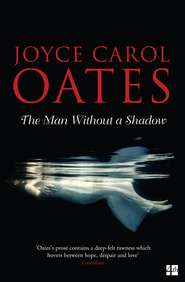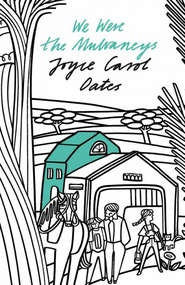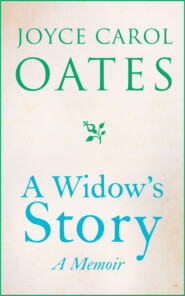По всем вопросам обращайтесь на: info@litportal.ru
(©) 2003-2025.
✖
My Life as a Rat
Автор
Год написания книги
2019
Настройки чтения
Размер шрифта
Высота строк
Поля
A likeness of Hadrian Johnson filled the screen, the photo that would be published with his obituary: young-looking, boyish, sweet smile, gat-teeth.
Our mother was moaning softly to herself. She’d been in an agitated state since we’d come home from school and even now the telephone was ringing, she didn’t seem to hear.
My sisters Miriam and Katie, my brothers Les and Rick, remained staring numbly at the TV screen though an advertisement had come on. They were quieter than I had ever seen them. Les said he knew Hadrian Johnson—sort of. Katie said she knew his sister Louise. Miriam, who never dared smoke at home, fumbled for cigarettes in a pocket, lit one with trembling hands and our staring blinking benumbed mother paid not the slightest heed.
How much they all knew, or had guessed, I did not know.
I did not understand how this terrible news could be related to my brothers. There was something I was forgetting—the baseball bat? In my confusion it seemed to me that Hadrian Johnson must have been beaten by the same persons who’d fought with my brothers—sons of bitches at the Falls.
Niagara Falls was seven miles away. This beating had been here in South Niagara, on Delahunt Road.
There were long-standing rivalries between the high school sports teams. Sometimes these spilled over into acts of vandalism, threats, fights. Beatings.
That must have been it, I thought. Guys from Niagara Falls, invading South Niagara. Often there were attacks of graffiti on the South Niagara high school walls, obscene words and drawings after a weekend.
From what my brothers had told me it sounded as if they’d been at the Falls and had been fighting there. Was it possible, I’d heard wrong?
I won’t tell Dad. I won’t tell anyone. I promise!
In the aftermath of the TV news our mother stood slowly, pushing herself up from the couch. With the stiff dignity of one in great pain who is resolved not to show it she made her way out of the room. We saw her lips moving wordlessly as if she were praying or arguing with someone. Her eyes had become glazed, as if she were staring at something pressing too close to her face, she could not get into focus.
She would hide away in the house, in this benumbed state. She would hide like a wounded creature. As after what she called the trouble with the Deaver girl for weeks she’d been reluctant to leave the house knowing that she had to encounter friends, acquaintances, neighbors eager to commiserate with her about the terrible injustice to which the Kerrigan boys had been subjected …
For it was not always clear, our mother knew: the distinction between commiseration and gloating.
Eventually, the Deaver girl was forgotten. Or people ceased speaking of her to Lula Kerrigan.
From that time onward, we noticed that Mom was becoming more religious. If that’s what it was—“religious.”
At church she sat stiffly at attention. You would think that her mind was elsewhere, her expression was so vacant. Yet, she would suddenly cover her face with her hands as if overcome with emotion. As the mass was celebrated by slow painstaking degrees, as the priest lifted the small pale wafer in his hands to bless it, to transform it into the body and blood of Jesus Christ, the ringing of the little silver bell seemed to prompt our mother to such behavior, mortifying to those of us who had to crowd into the pew with her—in recent years just the younger children, and Miriam.
It was rare that Daddy came to mass with Mom. Rarer still that Jerr or Lionel came. But Les, sometimes. And Katie, and Rick. And Violet Rue who was usually squeezed between Katie and Mom, a fidgety child, easily bored.
Violet Rue hated church. Oh but she feared church—the sharp-eyed God who dwelt inside the church, and who knew her innermost heart.
Sometimes, when Mom lowered her hands from her face her eyes were brimming with tears.
Tears of hurt, or fear?—triumph? Vindication? You could not say, you dared not look at the shining face.
Making her way to the communion rail then, swaying like a drunken woman, oblivious of her children. She was in the presence of God, she had nothing to do with them at this moment.
A mother’s public behavior can be a source of great mortification to her children, especially her daughters. (As our father’s never was.) (Maybe because we saw Mom much more frequently in public places than we saw Dad.) The red-lipstick mouth that stood out like a cutout mouth in her pale, fleshy face, the thin-plucked eyebrows that would never grow back, white vein-raddled bare legs in summer and spreading hips, hair beginning to grow gray in swatches—all these were shameful to sharp pitiless eyes. And the exasperating precision with which Mom parked her car, which required numerous attempts. The muffled exclamations, choked-back sobs.
Oh, God. Help me!
I adored my mother but also, I guess I hated her. More and more, as I grew older and Mom seemed never to change except to become more exasperatingly herself.
After the TV news we went away stunned. It was as if a fire were burning somewhere in the house, no one knew where. I could hear Katie’s bewildered voice and Miriam telling her sharply just be still, not to bother Mom.
I wanted to tell them: I knew much more than they did. Our brothers had entrusted me with a secret as they had not entrusted them.
For seven hours my father remained with Jerr and Lionel at police headquarters as they were being interviewed. (Not “interrogated,” since they had not—yet—been arrested.)
Initially, my brothers denied any involvement with Hadrian Johnson, at any time.
Then, Jerr conceded that just possibly he’d struck something, or someone, driving on Delahunt Road on Saturday night. And he’d been drinking—a few beers. And maybe speeding, a few miles over the forty-five-mile-an-hour limit.
Definitely, he’d heard a thud. He and Lionel both. Looked in the rearview mirror but didn’t see anything, guessed it might’ve been a deer, or a bicycle abandoned at the side of the road.
Had anyone else been with them?—my brothers were asked.
At first, reluctant to give the names of the other boys. For they were not the kind of guys to rat on their friends.
At first, shaking their heads no.
Though soon, after repeated questions, and Daddy’s increasing impatience, they acknowledged yes—there were two other guys with them, in the backseat of the car.
And so, my brothers did “rat” on their friends after all. (Would this be held against them?—it did not seem so.)
I would wonder when our father was told by police officers about Hadrian Johnson—what had been done to him, what condition he was in; when this had happened, and what a witness had reported.
When Daddy had no choice but to realize that the trouble his sons were in wasn’t just a hit-and-run accident.
After seven hours Daddy was allowed to bring my brothers back to the house. They had not (yet) been arrested. They had been warned, and had agreed, not to leave South Niagara but to be available for further questioning as soon as the next day.
It was after 9:00 P.M. They were exhausted, and they were starving. In the kitchen they ate the supper Mom had prepared for them, kept warm in the oven. No one else was welcome in the room though we were all told—by Daddy, for Mom could not bear to speak—that there’d been a “misunderstanding” by the South Niagara police—a “misidentification”—that would be straightened out in the morning, with the lawyer’s help.
Rick asked if it had anything to do with Hadrian Johnson getting beaten and Daddy said angrily no it did not.
What we could see of our older brothers, they were looking fatigued, grim. Their jaws were dark with stubble and their eyes were rimmed with shadow. Lionel didn’t smirk as he usually did if someone was looking at him more intently than he liked and Jerr ignored us altogether.
Katie and I went to bed, later than our usual hour. And in our beds we lay unable to sleep. Katie said, “I guess Jerr and Lionel are in some kind of trouble from the other night. With Jerr’s car? You think—they were drinking?”
Of Hadrian Johnson she did not speak, as if she’d forgotten him.
And I’d forgotten him, too. And the baseball bat.
Strange to be lying beneath a warm comforter, in flannel pajamas, shivering. So hard, my teeth were chattering.
And my head was aching, as it sometimes did when I lay down, my head on a single pillow; too much blood rushed into it. Badly I wanted to just lie there in the dark, not having to see another person, not having to hear another person speak and not having to speak myself. Not having to think about anything that was upsetting, frightening.
What is it? Why?
AT FIRST I THOUGHT IT WAS WIND SCRAPING BRANCHES AGAINST the roof of the house then I understood it was Daddy speaking with my brothers in the kitchen below. His voice was low and urgent, their voices were murmurs. At times it sounded as if he was giving them instructions, and at times it sounded as if he was pleading with them. And then his voice was abrupt, as if he was interrupting them. I could not hear words distinctly, for the pounding of my heart.
I was sick with the knowledge of what Jerome and Lionel had done even as I could not quite understand what they had done for still I was thinking of Niagara Falls … I had no wish to eavesdrop now. Never would I eavesdrop on anyone again.
It was frightening to me, I did not think that I could lie, if I was questioned about my brothers. If police officers questioned me.











